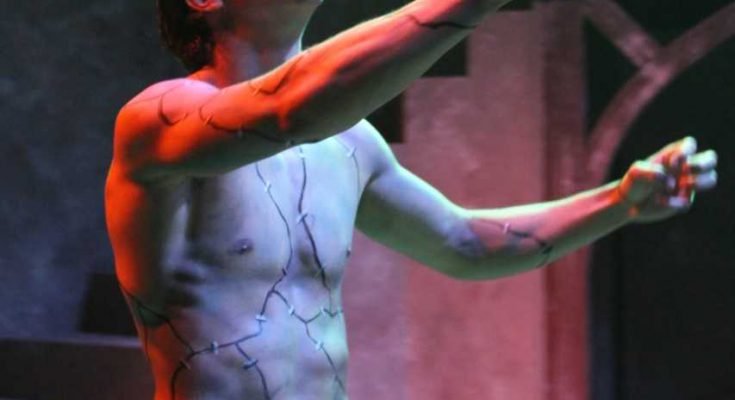Regardless of Orange County’s blistering heat, people are still cozying up with their pumpkin-spiced lattes and watching scary movies. The Lyceum Theater was no exception to these traditions, with a Halloween premiere of its second show of the season, the frightful classic, Frankenstein.
Unfortunately, what was more frightful than the story itself was the adaptation chosen. Though the classic has many stage adaptations, the Lyceum Theater chose one first done by Bruce Goodrich at California State University, Fullerton last year. This version frames the story in the middle of the original author Mary Shelley’s writing process. Vanguard’s performance of a story within a letter within a play sought to answer essential human questions. How much will a man sacrifice for knowledge? And at what cost? The real question is, are you willing to sacrifice $15 for a confusing and anticlimactic story?
This adaptation highlights the journey of Mary Shelley to write this horror classic. The story of Dr. Frankenstein’s tragedy is told through a series of letters by a homesick scientific adventurer, Robert Walton, who encountered Frankenstein mid-pursuit of his Creature. The play jumps between Mary Shelley’s real life and Robert’s letters about Dr. Frankenstein’s life. If you’re already confused by that description, don’t worry, the audience was too.
Entering the Lyceum, I was met with an accurate atmospheric fog that immediately set an ominous tone for the production. That apocalyptic ambiance, however, was inconsistent throughout the production as a whole. Besides the creepy lighting and sound effects during the Creature’s resuscitation, the show featured oddly-placed musical transitions and sporadic technical effects.
Senior Pierre Ekladios and junior Ethan Boyle, who played Dr. Frankenstein and the Creature respectively, carried the cast of primarily underclassman through a rollercoaster of philosophy and humor. The deep philosophical questions presented by Dr. Frankenstein were met by caveman grunts and gestures from the Creature, prompting giggles from the audience but ultimately discounting the profound nature of the dialogue.
Boyle’s lighthearted portrayal brought humanness and evoked sympathy for a notoriously disgusting being. He first enters the world abandoned yet curious about who and what he is. He spends time observing a family from afar, watching their interactions and mimicking their words, revealing a sensitive side. With intentions for benevolence — a word he learns from his “family” — he attempts to interact with other humans, each encounter resulting in the same disgusted rejection.
Anger fuels retaliation, and the Creature begins to seek revenge on his creator. While the show seeks to reveal the deeper meaning of human connection, the overall message is lost in the poorly explained passages of time and the jerky transitions between writer and story.
Additional Frankenstein family standouts were sophomore Isabella Totpal and junior Erick Paul as William and Ernest Frankenstein. Totpal’s childlike curiosity and joy brought a smile to the audience’s face, and Paul’s wisdom and insight brought depth to the ensemble character.
Unfortunately, the complicated storyline was left unsupported by the rest of the cast.
For an expectedly morbid show, the numerous deaths were as sudden and forced as the subsequent sobbing, and each was paired with cringe-worthy length and awkwardness. Senior Megan Fox, as the Female Creature, was the only character to die believably, a necessity in a classic tragedy.
Adding to the show’s incredulity was freshman Charlton Hughes’ portrayal of De Lacey, a blind, ailing father. The audience had no indication that the character couldn’t see besides the line “I can’t see anything” and a walking cane, that I suppose was meant to replace a probing cane.
Supplementing the inconsistency, a cast of 15 portrayed a company of over 30 with indistinguishable characteristics and no costume changes. The lack of change of dress, in combination with the overlapping storylines, made for a hard-to-follow evening.
While I had to do some additional Googling when I got home to understand the sequence of events, the redemptive and profound message was not entirely lost.
The surprising sensitivity of the Creature pitted against the intelligent, but arrogant Dr. Frankenstein led me to ponder, “Who is the real monster?” However, the scattered bright spots were not enough to fully resurrect the show. The choice of adaptation, inconsistency of effects, and poor acting made this play truly frightening, but not in the way it was intended.

 Music Department revives New York tour
Music Department revives New York tour The Great Divorce at the Lyceum Theater: A Play Review
The Great Divorce at the Lyceum Theater: A Play Review Life, Tragedy, Redemption: Vanguard Stage Brings Shakespeare to Life
Life, Tragedy, Redemption: Vanguard Stage Brings Shakespeare to Life Is Anyone Watching Award Shows?
Is Anyone Watching Award Shows?
Funny how you also wrote a piece explaining how the theatre department is struggling financially and yet now you’re telling your readers to not waste their money on supporting the arts. weird flex but ok.
Hi Alicia,
Thank you for pointing that out. If you read my previous piece it highlights the significance of Vanguard’s scholarship to the theatre students. This article is not suggesting that that is no longer important. Nor is it suggesting that the arts, or Vanguard’s department for that matter, are a waste of money. As a former theater major, I know the level of excellence the department can produce – this review simply states one audience members opinion on a new adaptation of a classic tale.
The story of Frankenstein takes place in the late seventeen hundreds or in the early eighteen hundreds, depending on what adaptation used. In regards to the misuse of the cane that Charlton Hughes used in the show, you suggested that a probing cane (aka white cane) should have been used. Had you done your research you would have discovered that the white cane wasn’t invented until 1921, a full one hundred years after the story of Frankenstein took place. In saying that Ethan and Pierre carried the show, are you discounting the hard work and effort the lower classmen put into this show? In your final paragraph you said “and poor acting made this play truly frightening, but not in the way it was intended.” Are you implying that the director of the show, head of the Theatre Department, did not do her job well enough?
Considering the fact that the Theatre Department is small and has dealt with more than it’s share of budget cuts, I personally thought the show was a success. I, as well as many other audience members I discussed the play with, found the transitions, including the musical transitions, to not only to be done to their best ability, considering their resources, but more importantly helpful to the storyline. It made it easier for us to follow the story. I also thought the underclass man, and the upperclass men, did well overall. I do agree the whole double roles and the lack of costume changes made it difficult for the audience to follow at times but it was easy to realize when the roles changed by their body language. I appreciate your opinion and your insight on the play but I have to disagree with you on majority of the points you made in this article, respectfully.